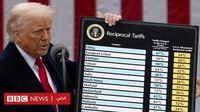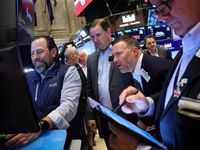On April 9, 2025, major indices on Wall Street in New York saw a significant rise after a tumultuous week marked by a broad selling wave that cost trillions of dollars. The New York Stock Exchange indices closed positively following three turbulent sessions, as optimism grew regarding potential negotiations between Japan and the United States concerning American customs policies.
The Dow Jones Industrial Average surged by 3.51%, the Nasdaq climbed by 3.70%, and the Standard & Poor's 500 index increased by 3.30%. This rebound was mirrored in global markets, with American futures also rising in early trading, buoyed by gains in the Tokyo Stock Exchange. The Nikkei 225 index recorded an impressive increase of over 6%, as investors reacted positively to statements from U.S. President Donald Trump regarding customs policies.
Japanese Finance Minister Shunichi Suzuki expressed his welcome for constructive dialogue with Trump, addressing concerns over the handling of American customs policies and emphasizing the need to restore confidence among investors. Meanwhile, the Chinese Ministry of Commerce reiterated its firm stance against the U.S. tariffs, stating that it would 'fight to the end' and take resolute measures against American actions.
On the same day, the European markets also experienced a recovery from their lowest levels in 14 months. The European Stoxx 600 index rose by 1.1% at 07:48 GMT, recovering from a steep 12.1% decline over the previous four sessions. The German DAX index also saw a 1.1% increase. Despite this, investors remained cautious about the ongoing developments related to American customs.
The backdrop of this market activity is President Trump's recent decision to impose tariffs on approximately 60 countries, effective April 10, 2025. This significant move is part of his broader strategy aimed at addressing trade deficits and includes a dramatic increase in tariffs on Chinese goods, with some tariffs exceeding 100%. Trump described these tariffs as 'legendary, in a positive way' during a Republican dinner.
In response to these developments, the Chinese government issued a statement through its official media, declaring, 'We do not cause trouble, but we are not afraid of it.' They emphasized that the Chinese people do not respond well to threats and intimidation and reassured that they are committed to defending the multilateral trading system. The statement also highlighted that China has not closed the door to dialogue, suggesting a willingness to negotiate despite the tensions.
As the situation unfolds, South Korea has stepped in to support its automotive sector, which has been one of the hardest hit by the new U.S. tariffs. After the U.S. imposed a 25% tariff on South Korean cars, Seoul announced a substantial emergency support plan, injecting an additional $1.5 billion into the sector, reducing taxes on car purchases, and adjusting support for electric vehicles.
The South Korean government has recognized the critical nature of this situation, as exports of vehicles to the United States account for nearly half of its total car sales abroad. This proactive approach aims to stabilize the market and mitigate the impact of U.S. tariffs on its economy.
Meanwhile, in Taiwan, the government has activated a $15 million contingency fund to prepare for potential market fluctuations resulting from the trade tensions. This measure reflects the broader regional concern regarding the economic implications of the escalating trade war.
As global markets react to these developments, the uncertainty surrounding the permanence of Trump's tariffs looms large. Investors and political leaders are grappling with whether these tariffs are a long-term strategy or merely a negotiating tactic to extract concessions from other nations.
In summary, the recent fluctuations in the stock markets and the imposition of tariffs reflect a complex interplay of global economic forces. Investors are keenly watching for signs of progress in negotiations between the U.S. and its trading partners, particularly Japan and China. The outcome of these discussions could have far-reaching implications for the global economy.





